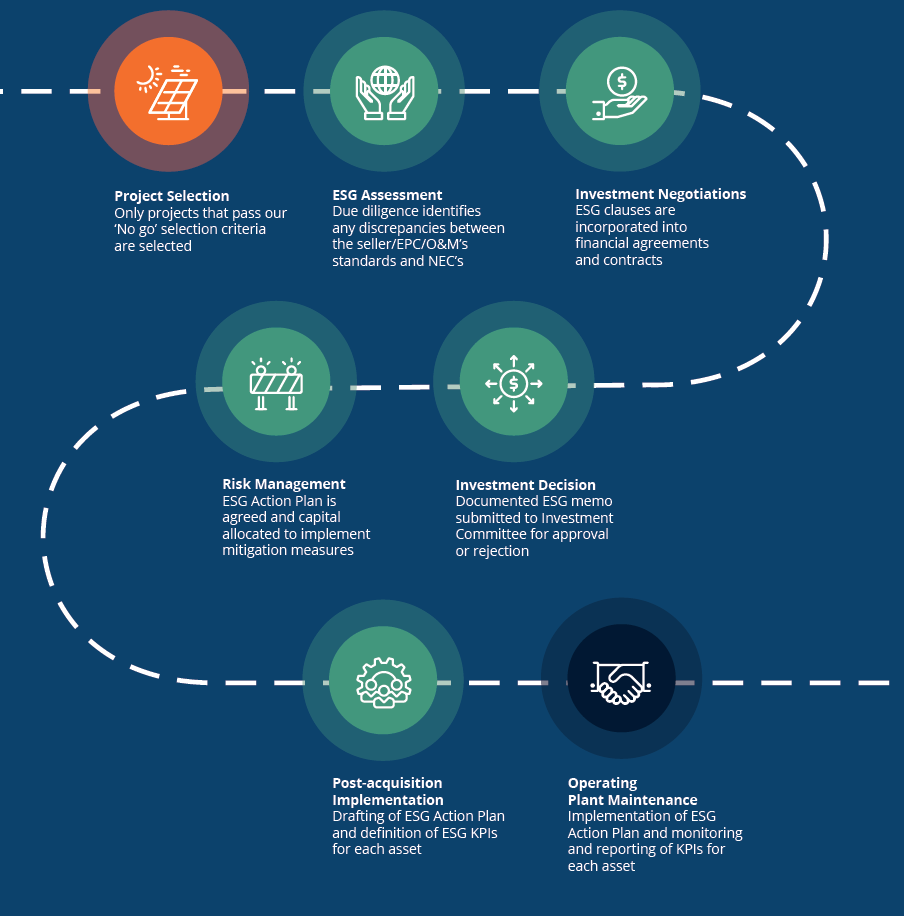To generate a more sustainable future, by leading the transition to clean energy
Sustainability is at the heart of NextEnergy Solar Fund’s strategy, values and culture. The Fund is committed to ensuring that there are positive impacts on nature and local communities in the areas within which it operates, whilst leading the transition to a future of clean energy.
NextEnergy Solar Fund not only delivers attractive returns to investors, it offers additional environmental value by providing secure, cost-effective, and locally scalable solar and energy storage assets.
Our approach to sustainability is built on three pillars:
1) Climate change
2) Biodiversity
3) Human rights
Each pillar poses material challenges to NESF, but also presents real opportunities to make a positive impact. In doing so, we contribute to decarbonisation – helping to address climate change and generate a more sustainable future.
We champion biodiversity by transforming our solar farms into environmental sanctuaries that help balance nature’s assets – supporting fauna and flora, local farmers and local communities. This means we are adding to nature and local ecosystems, and developing co-benefits with the surrounding environment and communities.
We work to ensure human rights are strengthened throughout our own activities and in our supply chain. We address the needs of local people wherever we operate – investing in local communities, promoting climate and STEM (science, technology, engineering and mathematics) education and contributing to job creation.
Investment decision-making
ESG is integrated at every stage of investment decision making. This is based on a four-step process:
- Identifying and assessing ESG issues from the very beginning of a transaction.
- Managing any risks, and acting on the opportunities, presented by ESG.
- Reporting on ESG matters through the NESF website and other disclosures.
- Engaging continuously on issues of material concern to NESF.
Identifying and managing ESG issues
NESF undertakes due diligence during the pre-acquisition phase of every project. The purpose of this is to identify potential ESG risks. The process is as follows:
- First, an initial screening is carried out, to ensure that the asset would not represent an investment in any excluded activity.
- Next, detailed ESG due diligence is conducted. This includes,
- Ensuring that the project is aligned with NextEnergy Capital’s Sustainable Investment Policy.
- A structured review of the asset using NextEnergy Capital’s proprietary solar site assessment tool, which covers all relevant ESG criteria, including climate and the environment, land use and heritage impacts, the project’s supply chain, and social and community issues.
- The discussion of any ESG risks and opportunities identified by the ESG team and Investment team, and, where relevant, external advisers. The parties agree upon appropriate mitigation measures where necessary.
- Producing an asset-specific action plan (which is generated by the tool), that fully captures all risks, opportunities and mitigation measures.
- Any additional due diligence that may be required, which can be carried out by NextEnergy Capital personal or third-party specialists.
- The outcome of the due diligence process is then presented to the NESF Investment Committee for a final decision.
- Post-acquisition, the Action Plan is agreed with EPC, O&M and other contractors, and handed over to the Portfolio Management team and WiseEnergy for management.
- Finally, WiseEnergy oversees the implementation of the Action Plan, including biodiversity and land management, community engagement, and health and safety.

Engagement and Stewardship
During the reporting year, several members of NEC’s staff engaged with Solar Energy UK (SEUK) across various workstreams, including the SPV Director, who chairs the SEUK Natural Capital Working Group, and the Head of ESG was recently appointed chair of the SEUK Supply Chain Working Group. Other employees are involved with supporting SUK on their engagement with the Department for Business, Energy and Industrial Strategy (BEIS) on the technical interpretation of the Nationally Significant Infrastructure Projects (NSIP) threshold. Additionally, members of the team have been working with Ofgem around the Renewables Obligation (RO) audits program.
